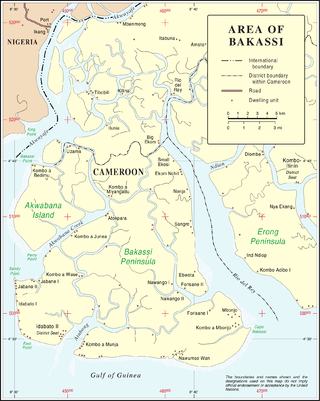
Bakassi is a peninsula on the Gulf of Guinea. It lies between the Cross River estuary, near the city of Calabar and the Rio del Ray estuary on the east. It is governed by Cameroon, following the transfer of sovereignty from neighbouring Nigeria as a result of a judgment by the International Court of Justice. On 22 November 2007, the Nigerian Senate rejected the transfer, since the Greentree Agreement ceding the area to Cameroon was contrary to Section 12(1) of the 1999 Constitution. Regardless, the territory was completely ceded to Cameroon on 14 August 2008, exactly two years after the first part of it was transferred.

Cameroon, officially the Republic of Cameroon, is a country in Central Africa. It shares boundaries with Nigeria to the west and north, Chad to the northeast, the Central African Republic to the east, and Equatorial Guinea, Gabon, and the Republic of the Congo to the south. Its coastline lies on the Bight of Biafra, part of the Gulf of Guinea, and the Atlantic Ocean. Due to its strategic position at the crossroads between West Africa and Central Africa, it has been categorized as being in both camps. Cameroon's population of nearly 31 million people speak 250 native languages, in addition to the national tongues of English and French, or both. Early inhabitants of the territory included the Sao civilisation around Lake Chad and the Baka hunter-gatherers in the southeastern rainforest. Portuguese explorers reached the coast in the 15th century and named the area Rio dos Camarões, which became Cameroon in English. Fulani soldiers founded the Adamawa Emirate in the north in the 19th century, and various ethnic groups of the west and northwest established powerful chiefdoms and fondoms.
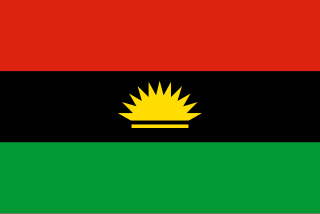
Biafra, officially the Republic of Biafra, was a partially recognised country in West Africa that declared independence from Nigeria and existed from 1967 until 1970. Its territory consisted of the former Eastern Region of Nigeria, predominantly inhabited by the Igbo ethnic group. Biafra was established on 30 May 1967 by Igbo military officer and Eastern Region governor Chukwuemeka Odumegwu Ojukwu under his presidency, following a series of ethnic tensions and military coups after Nigerian independence in 1960 that culminated in the 1966 anti-Igbo pogrom. The Nigerian military proceeded in an attempt to reclaim the territory of Biafra, resulting in the start of the Nigerian Civil War. Biafra was officially recognised by Gabon, Haiti, Ivory Coast, Tanzania, and Zambia while receiving de facto recognition and covert military support from France, Portugal, Israel, South Africa and Rhodesia. After nearly three years of war, during which around two million Biafran civilians died, president Ojukwu fled into exile in Ivory Coast as the Nigerian military approached the capital of Biafra. Philip Effiong became the second president of Biafra, and he oversaw the surrender of Biafran forces to Nigeria.

Paul Biya is a Cameroonian politician who has served as the second president of Cameroon since 6 November 1982, having previously been the prime minister of Cameroon from 1975 to 1982. He is the second-longest-ruling president in Africa, the longest consecutively serving current non-royal national leader in the world and the oldest head of state in the world.

Cross River State is a state in the South-South geopolitical zone of Nigeria. Named for the Cross River, the state was formed from the eastern part of the Eastern Region on 27 May 1967. Its capital is Calabar, it borders to the north through Benue state, to the west through Ebonyi state and Abia state, and to the southwest through Akwa Ibom state, while its eastern border forms part of the national border with Cameroon. Originally known as the South-Eastern State before being renamed in 1976, Cross River state formerly included the area that is now Akwa Ibom state, which became a distinct state in 1987.

Calabar is the capital city of Cross River State, Nigeria. It was originally named Akwa Akpa, in the Efik language, as the Efik people dominate this area. The city is adjacent to the Calabar and Great Kwa rivers, and the creeks of the Cross River.

The Southern Cameroons was the southern part of the British League of Nations mandate territory of the British Cameroons in West Africa. Since 1961, it has been part of the Republic of Cameroon, where it makes up the Northwest Region and Southwest Region. Since 1994, pressure groups in the territory claim there was no legal document in accordance to UNGA RES 1608(XV) paragraph 5, and are seeking to restore statehood and independence from the Republic. They renamed the British Southern Cameroons as Ambazonia.
Chief Tony Ene Asuquo was a leader of the Bakassi Movement for Self-Determination, which seeked for the independence of Bakassi.

The Bakassi Movement for Self-Determination (BAMOSD) is a militant organization that seeks for the independence of Bakassi, a territory of Cameroon and formation of the Democratic Republic of Bakassi. The movement played a leading role in the Bakassi conflict.
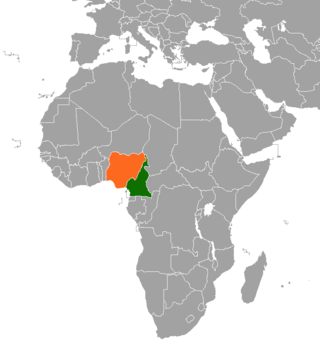
Relations between Cameroon and Nigeria were established in 1960, the same year that each country obtained its independence. Since then, their relationship has revolved in large part around their extensive shared border, as well as the legacy of colonial arrangements under which areas of Cameroon were administered as part of British Nigeria. The countries came close to war in the 1990s in the culmination of a long-running dispute over the sovereignty of the Bakassi peninsula. In the 21st century, however, a return to conviviality has been achieved, partly because the demarcation of their border has been formalised, and partly because the Boko Haram insurgency in the Lake Chad basin has necessitated increasingly close cooperation in regional security matters.

Florence Ita Giwa is a Nigerian politician, who was the Senator for the Cross River South Senatorial District of Cross River State.
Bassey Ekpo Bassey II is a Nigerian journalist and politician
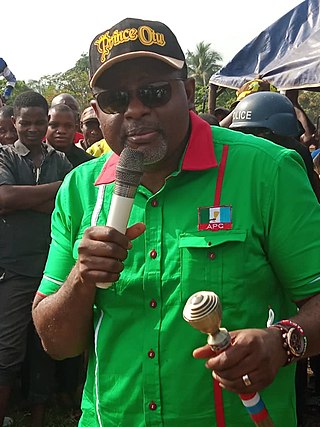
Bassey Edet Otu is a Nigerian politician and the current governor of Cross River State Southern Nigeria. who served as a one time senator for Cross River South from 2011 to 2015, and a one time representative of Calabar Municipal/Odukpani constituency of Cross River State, in the House of Representatives from 2003 to 2011.
The Greentree Agreement is a formal treaty which resolved the Cameroon–Nigeria border dispute over the oil and natural gas-rich Bakassi peninsula. The dispute had roots as far back as 1913; in 1981, 1994, and 1996 armed clashes between Nigeria and Cameroon took place in Bakassi. The dispute was referred to the International Court of Justice and on 10 October 2002 the ICJ ruled in favor of Cameroon.
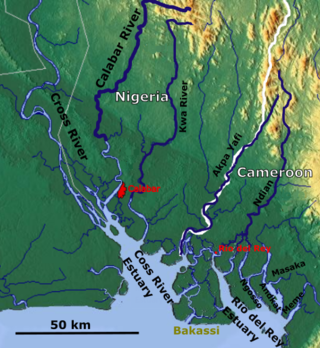
The Rio del Rey is an estuary of a drainage basin in West Africa in Cameroon. It is located in the eastern area of the Niger River system. The Cameroon volcanic line separates Rio Del Rey from the Douala basin. Rio del Rey has been described as an estuary in which "the two rivers N'dian and Massake flow out". The mouth is close to the border with Nigeria and has connections to the Cross River estuary from which it is separated by the Bakassi peninsula. The Rio del Rey estuary has been designated as a Ramsar site since 2010.

The Bakassi conflict is an ongoing armed dispute over the Bakassi Peninsula of Cameroon. Originally subject to a border conflict between Cameroon and Nigeria, Bakassi later became affected by insurgencies waged by local separatists against Cameroonian government forces.

The Cameroon–Nigeria border is 1,975 km in length and runs from the tripoint with Chad in the north to the Atlantic Ocean in the south.

The insurgency in Southeastern Nigeria is a military conflict that broke out in the city of Orlu, Imo State, Nigeria on 16 January 2021, when the Nigerian Army moved to crush the paramilitary wing of the Indigenous People of Biafra (IPOB), the Eastern Security Network (ESN). The conflict escalated after the ESN managed to repulse the initial push by the Nigerian Army, but IPOB ended the initial crisis by unilaterally withdrawing the ESN from Orlu. After a few weeks of quiet, Nigeria launched a military offensive in the area to destroy the ESN. On 19 February 2021, IPOB declared that as of the day before, a state of war existed between Nigeria and Biafra. Three weeks later, another separatist group declared the formation of a Biafran interim government which was subsequently endorsed by IPOB. Since then, the Biafran separatists have begun to form alliances with other separatist groups in Nigeria and Cameroon. Despite these developments, the separatists claimed that their militant operations were mainly aimed at defending local communities from armed herders and bandits instead of fighting the Nigerian government. In late June, IPOB leader Nnamdi Kanu was arrested by Interpol and handed over to Nigerian authorities.
The 1999 Nigerian Senate election in Cross River State was held on February 20, 1999, to elect members of the Nigerian Senate to represent Cross River State. John James Akpan Udo-Edehe representing Cross River North, and Matthew Mbu representing Cross River Central won on the platform of the Peoples Democratic Party, while Florence Ita Giwa representing Cross River South won on the platform of All Nigeria Peoples Party.

The Biafra Nations League, initially known as the Biafra Nations Youth League, is a secessionist group in Nigeria's eastern region with operational headquarters in the Bakassi Peninsula. The group was established in Port Harcourt, Rivers State on 3 August 2013.















